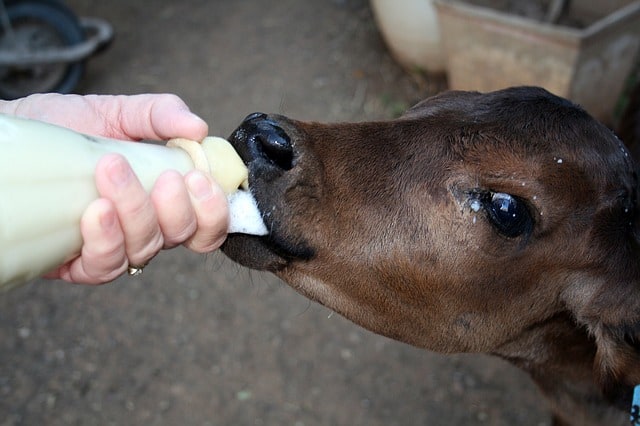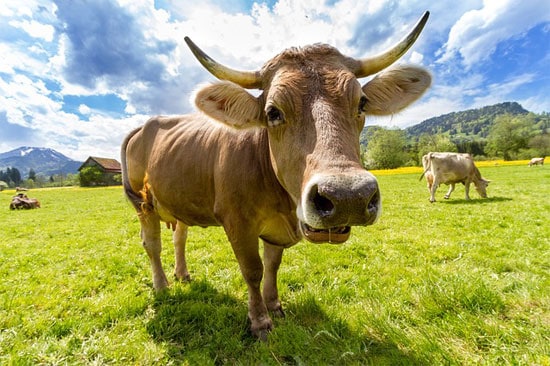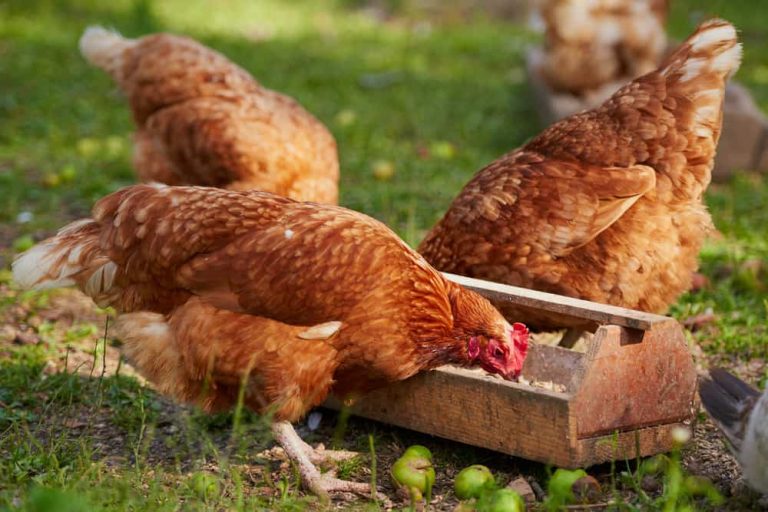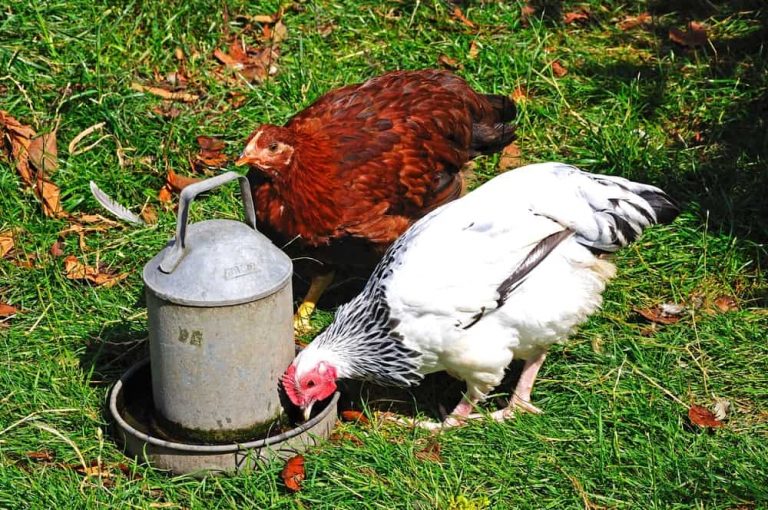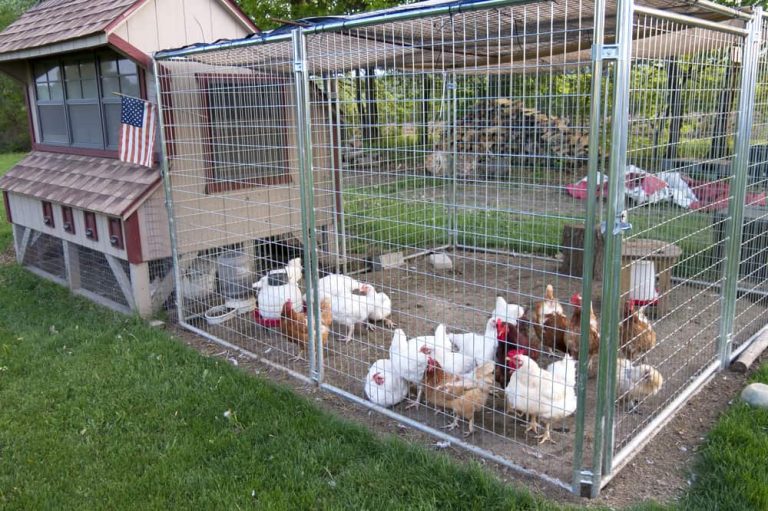Do you have a calf or baby animal whose mother won’t nurse? A mother’s inability or refusal to nurse her calf should not be a cause for concern for you.
A calf milk replacer can give the calf all the nourishment it needs to live a normal healthy life.
But what is a calf milk replacer? It is a standard and consistent quality feed formulated to meet the growth and development requirements of a young calf.
The formula must be dairy-derived. The feed should replicate the purposes of whole milk.
There are so many options featuring different formulations in the market.
It can be a daunting task to make an informed choice.
We have prepared informative, in-depth, impartial, and well-researched reviews and buying guides of the best milk replacer for calves. Please continue reading to find out more.
Image | Product Name | Size | Price |
1. Savacaf Grade A Ultra 24 Multi-Species Milk Replacer | 8 Pounds | ||
2. Manna Pro Milk Replacer | 6 Pounds | ||
3. Manna Pro Milk Replacer with Probiotics for Lambs | 3.5 Pounds | ||
4. Manna Pro NurseAll Non-Medicated Milk Replacer | 3.5 Pounds | ||
5. Manna Pro Unimilk Multi-Species Milk Replacer | 9 Pounds |
Contents
Top 7 Best Calf Milk Replacers
Here is a selection of some of the top-quality milk replacer brands in the market. We will show you why they are the best but the decision still lies with you.
Later, we will see a few considerations to help you further in making an informed choice.
1. Savacaf Grade A Ultra 24 Multi-Species Milk Replacer
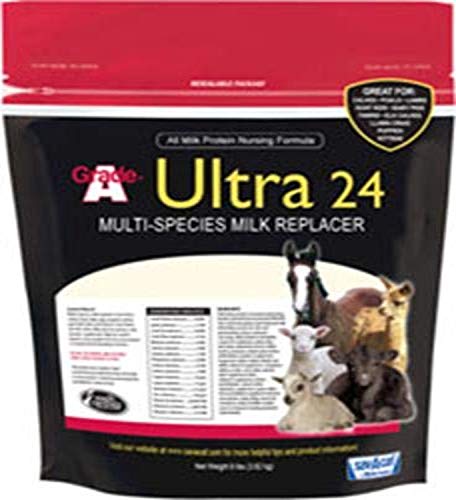
The Ultra 24 Multi-Species Milk replacer is a top-quality feed for calves and other young animals. It is suitable for piglets, foals, goat kids, lambs, llama and alpaca crias, elk calves, and fawns.
It is a high protein, high energy formula. It’s designed to give a calf the necessary nutrient for faster and healthier growth. The high energy content means your calf will be active and happy.
The formula consists of 24 percent fat and 24 percent all-milk proteins. These support optimal performance and digestibility. Furthermore, the replacer is fortified with essential minerals, vitamins, and supplements.
The micronutrients support the normal growth and development of the calf. They also act as supplements. These replenish nutrients and fluids to the calf in periods of illness and stress. The product comes in powder form.
Pros
- A universal milk replacer for common animals and pets A complete and well-balanced feed for up to 10 different species
- All-milk protein sources for optimal digestibility
- Easy to mix and use
- Highly palatable for calves so long as you serve at a good temperature
Cons
- A little bit costlier compared to other brands
- Be a little careful if giving a puppy because some puppy breeds are intolerant
2. Manna Pro Milk Replacer

Manna Pro Milk replace is a wonderful choice if you have a kid whose mother cannot nurse. It is a natural recipe. Its contents include vital probiotics to support healthy digestion and a healthy gut.
The formulation supports the healthy, rapid growth and development of your young animals. One of its salient features is the proprietary Opti-GutTM technology. It contributes to the well-being of the animal, supporting a healthy gut from start.
Manna Pro contains at least 26 percent crude protein and a minimum of 20 percent crude fat. It also has calcium, sodium, phosphorus, selenium, vitamins (A, D3, and E), and crude fiber.
It also contains a source of viable (live), naturally occurring microorganisms. Yeast cells are also included. The natural ingredients along with the probiotics help control harmful bacteria. They also support the growth of friendly bacteria in the gut.
The feed comes in powder formulation along with instructions on how to mix and serve it to your animal. The mixing process is made easy and fast.
Pros
- A high-quality all-milk protein for optimal growth and development
- Easily digestible due to Opti-GutTM technology
- Easy to prepare for quick and maximum consumption
- High protein content boosts growth
Cons
- Not a universal milk replacer so be careful
- Marketed for kids and works well in most but not for all kids
3. Manna Pro Milk Replacer with Probiotics for Lambs

Manna Pro markets this milk replacer for lambs but that does not mean you cannot use it to feed and nurse your calf. Many other species love it including puppies and kids. Only be careful if you notice any adverse reactions when feeding your calf.
The milk replacer formulation contains 30 percent fat. This provides optimal and efficient energy to a growing calf. Your bubbly calf will gain weight fast and healthy. Conversely, you will be able to wean much earlier than you would do with other brands.
Lactose levels in a calf formula have a great influence on the performance of the young animal. Manna Pro uses decreased lactose in preparing the replacer. This boosts performance and reduces scours.
The recipe also has organic acids, which enable free-choice feeding. Like all top-quality powder milk for calves, this brand has probiotics. These organisms boost the microbial content of the digestive system. This is important because probiotics aid in the digestion and health of the gut.
Pros
- A perfect formula for lamps and other young ones
- High-fat content stimulates faster growth
- Highly palatable for faster and complete consumption
- Not medicated to encourage probiotics
- Easy and fast to prepare
Cons
- Some mineral grit is left at the bottom of the feeding bottle
- Limited flexibility of use
4. Manna Pro NurseAll Non-Medicated Milk Replacer

Manna Pro provides some of the proven high-quality calf milk replacers in the market. The NurseAll is a universal line of replaces. It is formulated for nine species of animals and pets.
It is a good choice for nourishing calves, goat kids, foals, lambs, piglets, fawns, alpacas, llamas, and elk calves. The recipe consists of top-quality ingredients derived from milk proteins. This ensures excellent digestibility and healthy growth.
NurseAll contains 24 percent proteins and 24 percent fat. It also has several minerals and micronutrients for optimal growth and development. Vitamins A, D3, and E are other important nutrients. The formula delivers optimal nourishment.
Its Opti-GutTM technology provides your calf with yeast cells and probiotics. The innovative idea keeps the growth of harmful bacteria under control. It also promotes the population of friendly bacteria.
Pros
- Excellent digestibility and optimal consumption
- The non-medicated formula promotes gut health
- Highly versatile milk replacer with a range of 9 species
- Delivered as easy-to-mix powder
- More affordable compared to other top-quality brands
Cons
- Some reports of intolerance have surfaced but these are isolated cases
- There is a need to package it in a bigger bag for convenience
5. Manna Pro Unimilk Multi-Species Milk Replacer

Are you still confused about choosing from the above best calf milk replacer reviews? You can check this out – the Unimilk Multi-Species natural recipe. It is designed for four species of animal babies including calves, baby pigs, foals, and goat kids.
It comes complete with live microorganisms helpful to the gastrointestinal system. Manna Pro’s Opti-GutTM technology handles this. It spurs faster growth and development quickening weaning time.
The formula contains at least 20 percent crude fat, and 22 percent crude protein. It also has crude, fiber, lysine, and other important minerals. Other vital nutrients include three vitamins that function as antioxidants and structural components.
The purchase of this product comes with clear instructions on how to mix the powder with water. Also, you will find information on the recommended feeding plans for each species.
Pros
- Formulated for many species and offers optimal nourishment
- Highly digestible thanks to all-milk protein formulation
- It’s a great combination of value and performance
- High-quality protein is the basis of quick growth and development.
- It’s not medicated thus eliminating antibiotic resistance
Cons
- Marketed for multiple species but only limited for only 4 species
- Not for you if you want a milk replacer for your lambs
6. Advance Multi-Species Milk Replacer
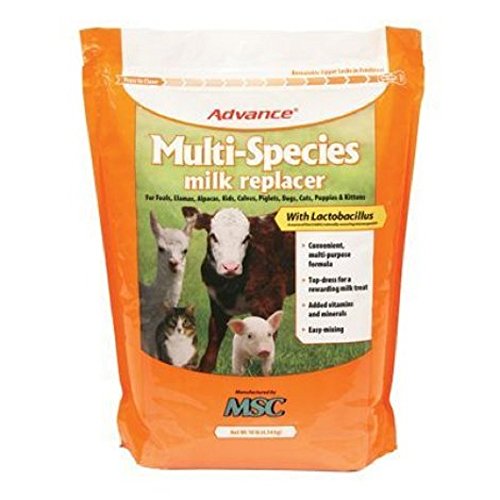
Advance offers you a good quality milk replacer for your calf. The Advance Multi-Species Milk replacer is composed of milk and modified wheat proteins. The formulation provides incredibly high protein for optimal digestibility.
The feed also features a high level of fat; an excellent source of dependable energy for the growing animal. In terms of quantity, the recipe consists of 20 percent protein and 20 percent fat.
The Advanced Multi-Species Milk replacer is acidified. This helps the natural acids present in the stomach to restrict the growth of harmful bacteria (E.coli). It also provides optimal pH for healthy digestion.
The ingredient list includes minerals and vitamins for optimal growth and balanced nutrition. Choose this replacer if you are looking for a product that is suitable for the young ones of all species.
Pros
- Provides natural flavor and protein digestibility
- High-fat content provides high energy levels
- Suitable for the young ones of all animals
- Comes in a bag you can re-seal to maintain freshness
- Provides optimum nutrition and growth
Cons
- Customers in California may be disadvantaged
- Relatively new in the market
7. Sav A Caf Milk Products Grade A Ultra 24 Milk Replacer

Are serious about the health of your calf? Do you have the financial muscle to maintain high-quality replacer milk for it? Check the Grade A Ultra 24 Milk Replacer from Sav A Caf out.
This universal milk replacer features unique, innovative, and exclusive crystal display technology. The innovation is unique. It makes this milk powder one of the best options currently on the market.
It features a recipe rich in protein (24 percent) and fat (24 percent). These ingredients are all protein. Your calf will have an easy time digesting and assimilating them. Extra vitamins and minerals ensure the young animal has all it needs to live a healthy vibrant life.
Sav A Caf designed this product for use as a dry supplement during moments of stress and at the time of weaning.
Pros
- A multi-purpose all-protein milk replacer
- Very easy to mix for quick and optimal consumption
- High protein high-fat formula
- Easily digestible and friendly to the developing gut of calves
Cons
- Many buyers find it a little bit pricier than other similar quality brands
- Multi-purpose but may not be suitable for some species
Buying Guide for the Best Milk Replacer for Your Calf
Have you found what you were looking for when you visited this site? If haven’t, don’t worry. We acknowledge that it can be a big challenge especially if you have limited experience with such products.
We are going to discuss a few important considerations that will help you a great deal in making the right choice.
One thing to keep in mind. Milk replacers can be as different from each other as the various species of colored butterflies.
However, there are primary ingredients that must be present in a milk replacer. These include proteins, fat, carbohydrates, vitamins, and minerals.
Let’s look at why these ingredients are so important.
Protein (Building Blocks Of The Body)
Proteins are essential for growth. At the lowest level, this nutrient helps to repair and build body tissues. It provides the animal body with a structural framework and coordinates bodily functions.
There are many more complex functions of proteins. Already, you can see that deficiency of this nutrient can have terrible effects on the growth and development of your calf.
In choosing the right milk replacer, you must look at the protein content. 20 to 22 percent protein content is good enough. But, higher values are excellent in spurring rapid growth.
The source of the proteins is also important especially based on the age of the calf. Calves that are less than three years old should be placed on all-milk protein replacers. Non-milk sources can lower the number of proteins available in the system of the calf. This can lead to adverse effects.
One of the commonest sources of milk proteins is whey – a by-product of cheese processing. So pay keen attention to dried whey, whey protein concentrate, or why product. If a product does not have any of these then it’s not suitable for a young calf.
Non-milk sources include soy protein, wheat proteins, soy flour, animal plasma proteins, and potato. These nutrients have poor digestibility. They can stimulate diarrhea – something you don’t wish your calf to suffer.
Fat (Long Term Energy Source)
The level or amount of fat contained in a milk powder for calves determines its energy content. The quality of fat in dry whole milk is 30 percent. Good replacer milk should have 10 – 25 percent of fat.
Generally, immature gut baby animals cannot digest non-milk fat. This leads to diarrhea. Milk-fat is way better and easily digested and tolerated. Common non-milk fats used are coconut oil, lard, and tallow.
Crude Fiber (Aids in Digestibility)
Fiber is important in aiding digestion and gut health. But younger calves cannot handle high quantities in their feeds. The amount of fiber indicates the amount of plant protein in the formula. Thus higher plant protein content correlates with a high content of crude fiber.
Choose a replacer that contains little amount of fiber if your calf is three weeks of age or less. The quantity should be less than 0.5 percent in the feed. As the calf is growing older, its ability to digest fat also increases. Thus you can go for a replacer with increasing crude fiber content.
Minerals and Vitamins
The most important vitamins for a growing calf are vitamins A, D, and E. The quantity varies greatly. Yet there are recommended ranges per species.
Discussing these ranges is beyond the scope of this buying guide. However, it would be good to do further research so that you are fully informed.
Minerals are important in fluid balance. They also influence the functioning of the body systems of your calf. Growing baby animals need calcium, sodium, phosphorus, iron, copper, chloride, and selenium. The proper balance of these substances is crucial in growth and development.
Other important considerations include:
- Smell, Consistency, and Appearance
The idea of using a milk replacer is to provide the calf with an alternative to its mother’s milk. So, the powder should smell, appear and have the consistency of breast milk.
While there is no perfection, a good quality milk powder should be creamy to light tan in color. It should be free from lumps and foreign objects. Little brown spots may be normal as the powder dries. But an overt change in color indicates a loss of nutrients.
We all know how milk smells. It has a pleasant aroma. Signs of fat rancidity include the smell of paint, gasoline, clay, or grass. Rancid fat can be dangerous to your young calf.
- Ease of Mixture and Use
Feeding your baby animal should not be a daunting task for you. Choose a brand of calf milk replacer with simple and easy-to-understand instructions. Step-by-step feeding directions are easier to follow.
Ease of mixing and use is important but you must also have the right accessory for feeding your calf. We are talking about a nursing bottle.
The market is jam-packed with many different brands of this accessory. Nevertheless, certain brands stand out because of the quality of their bottles. One such brand is Lixit Animal Care Farm Baby Bottle.
The bottle is made of a heavy-duty BPA-free plastic bottle. It features a natural-feeling rubber nipple to provide optimal nourishment to your calf.
Another great feature is the screw-on neck ring. The ring keeps the young farm animal from pulling off the nipple while feeding by securing it. The design also makes the nipple easy to remove for thorough cleaning.
FAQs
- How much water should I mix with the milk replacer powder?
Ans: Good quality milk replacers will come with straightforward step-by-step instructions on how to mix. Make sure you read the instructions well
- When should I discontinue bottle feeding my calf?
Ans: you will need to stop giving your calf milk replacement when you begin to wean it. Generally, the weaning of calves begins from six weeks to two months.
- How much milk replacer should I feed my calf per day?
Ans: the amount you give depends on the weight of the calf. Veterinary officers recommend that you give the calf an equivalent of 8 to 10 percent of their birth weight per day. Give it in two feedings.
- When should I start feeding my calf with a milk replacer?
Ans: Usually, a calf feeds on colostrum for the first 24 hours after birth. You can feed it after that period. Colostrum is vital to the life of the calf and thus you need to ensure it gets it.
- What can I do if my calf refuses to feed on the bottle?
Ans: This could be because the calf does not feel the smell of the milk. Try smearing to the nipple and the bottle with milk. If it won’t suck from the nipple then you can try to get it to suck your finger. In case you don’t succeed, force-open its mouth and put it in the nipple to get the idea.
Conclusion
It’s our hope you are now sufficiently informed to venture out and make the right choice. Failure or refusal of a mother to nurse her calf should not condemn the calf to poor growth and development. You can see your calf or other baby animal grow healthy and vibrant by feeding it with the best calf replacer.
Related Posts:

